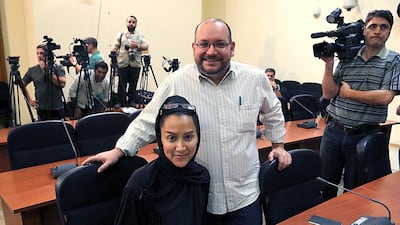New York // The United States and Iran carried out an exchange of prisoners on Saturday as the United Nations atomic watchdog prepared to clear the way for lifting sanctions on Tehran over its nuclear programme.
Four Iranian-Americans and an American student were released from jail in Iran, and six Iranian-Americans and an Iranian convicted in the US for violating sanctions were flown to Tehran. They were either pardoned or had the charges against them dropped.
The exchange came as the International Atomic Energy Agency was close to certifying that Iran had met all commitments under the nuclear deal with six world powers.
Among the prisoners released in Iran was Jason Rezaian, the Washington Post bureau chief who had been convicted of espionage charges widely considered spurious.
Rezaian was arrested 543 days ago and faced solitary confinement before a closed-door trial. His conviction was announced in October last year. Iran said the following month that he had been sentenced to prison, but did not say for how long.
The prisoners released with Rezaian were former US Marine Amir Hekmati, pastor Saeed Abedini and Nosratollah Khosravi. On Saturday night they were being flown from Iran to Switzerland aboard a Swiss aircraft and then transported to a US military hospital in Landstuhl, Germany, for medical treatment. Matthew Trevithnick, the student who had been detained a few months ago, was released independently and was already was on his way home.
Rezaian’s mother and his wife, Yeganeh Salehi, a correspondent for The National in Tehran, were thought to be with him on the Swiss plane. Salehi was arrested at the same time as her husband, and spent six weeks in jail.
Switzerland played a key part in the prisoner swap, Tehran’s ambassador to the UN Gholam Ali Khoshroo said. “It took almost a year and naturally the government of Switzerland as a facilitating country played a positive role in these negotiations.”
The prisoner swap was part of secret negotiations between senior US and Iranian officials conducted in parallel to the nuclear talks. US secretary of state John Kerry said during the two years of negotiations that the plight of the detained Americans was brought up with Iran during every round of negotiations but that the two issues would not be linked.
However, the swap was almost scuttled at the end of last month when Mr Kerry told the Iranian foreign minister Mohammad Zarif that new US sanctions against Iran were imminent as a result of its recent testing of ballistic missiles.
Mr Zarif said that if new sanctions were implemented, the prisoner exchange was off. As a result, the sanctions were scrapped for the time being, although they are expected to be introduced now that the prisoners are free, probably after next month’s national elections in Iran.
Frederick Ryan, publisher of The Washington Post, said: “We couldn’t be happier to hear the news that Jason Rezaian has been released from Evin Prison. Once we receive more details and can confirm Jason has safely left Iran, we will have more to share.”
Mr Hekmati’s lawyer, Mahmoud Tabatabaei, said his client called him on Saturday from prison. “He told me that judiciary officials had called for a meeting with him. But I’ve not been formally informed if he is free now,” he said.
Hekmati’s family said: “We thank everyone for your thoughts during this time. There are still many unknowns. At this point, we are hoping and praying for Amir’s long-awaited return.”
Mr Hekmati, of Flint, Michigan, was detained in August 2011 on espionage charges. He had gone to Iran to visit family and spend time with his ailing grandmother.
Mr Abedini, of Boise, Idaho, was detained for compromising national security, presumably because of Christian proselytizing, in September 2012. He was sentenced in 2013 to eight years in prison.
Rezaian was born in California and holds both US and Iranian citizenship. He was arrested in July 2014, when Iranian government security forces raided his home in Tehran residence and detained him and Salehi. She was released on bail on October 6.
Mr Khosravi’s occupation, and why he was in prison, are not known.
Robert Levinson, who disappeared in Iran in 2007 while working for the CIA on an unapproved intelligence mission, was not part of the deal. American officials are unsure if the former FBI agent is even still alive. The Iranians have always denied knowing where he is.
Mr Levinson’s case was aggressively pursued, US officials say, and Iran has committed to continue cooperating in trying to determine his whereabouts.
The exchange also did not cover Siamak Namazi, an Iranian-American businessman who advocated better ties between Iran and the US. He is thought to have been arrested in October.
The seven freed Iranians were named as Nader Modanloo, Bahram Mekanik, Khosrow Afghahi, Arash Ghahraman, Tooraj Faridi, Nima Golestaneh and Ali Saboonchi.
The release of the prisoners and the nuclear deal developments cap a week of intense US-Iran diplomacy that took an unexpected turn on Tuesday with the detention by Iran of 10 US Navy sailors and their two boats in the Arabian Gulf.
The sailors were released in less than 24 hours after Mr Kerry intervened with Mr Zarif in telephone calls that the White House hailed as a channel of communication opened because of the nuclear negotiations.
The negotiations over the American prisoners grew out of the Iran nuclear talks. In discussions in Europe and elsewhere, Mr Kerry and nuclear negotiator Wendy Sherman were able to establish a separate channel of talks that would focus on the US citizens.
But that channel was kept separate from the nuclear conversations. American officials didn’t want the citizens used as leverage in the nuclear talks, and didn’t want to lose their possible release if the talks failed to produce an agreement.
US officials say the Americans were a priority, but the Iranians wanted a goodwill gesture or reciprocal measure in return.
tkhan@thenational.ae
* Additional reporting by Reuters and the Associated Press

